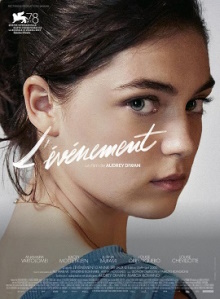A string of some of the recent films I’ve especially liked feature a back to basics approach. The same could apply to this film too as the story of a young girl getting an unwanted pregnancy is all too familiar. Offhand though, I can’t recall a single one of these stories that doesn’t put the blame squarely on the girl or end with her making peace with delivering the baby. This is unapologetically a pro-abortion film and it is far past time that something like it exists, to show just how powerless girls feel to have no control over the course of their own lives and how unfair it is that the burden falls entirely on girls while the guys just walk away with no consequences. At the same time, it doesn’t shy away from the ugliness of what an abortion really is either, making it practically required watching for sexual education purposes.
Anne is a literature student in 1963 who gets good grades and is highly regarded by the professors. She also sometimes goes to parties with her friends though she usually refrains from hooking up with guys. One day while being examined by her regular doctor for stomach pains, she is informed that she is pregnant. Anne is shocked and immediately asks the doctor if he can do something about it. He replies that abortion is illegal and punishable by imprisonment. She tries to ask for help from other parties but is shut down at every turn and even her friends shy away from her. She causes a ruckus at another doctor’s office to force him to help her and is given an injection that she finds out later actually strengthens the fetus. She even attempts to abort the fetus herself in her dorm room with a heated knitting needle but fails. The father is a political science student in another city. She had only had sex with him once and he is able to offer neither concrete assistance nor moral support, being a young man preoccupied with his own goals in life. As the pregnancy drags on and her body begins to change, Anne must hide her troubles from her parents and finds it impossible to concentrate on her studies.
It’s painful how familiar every beat of Anne’s story is. As this film makes clear, almost everyone at some point in their lives will have lived through at least some of what Anne experienced, yet discussing it is one of the strongest remaining taboos in modern society. It exposes the hypocrisy of demanding that young people refrain from all sex before marriage while knowing very well that everyone does it. It also shows to devastating effect how fundamentally unjust it is to punish women, and only women, for doing something that almost everyone does and how an unplanned pregnancy would forever change the course of her life if she were not allowed to terminate it. It captures her desperation in wanting to attempt to abort the fetus herself, with all the physical pain and danger that entails, while being frank that the procedure of abortion itself is inescapably horrific. As my wife notes, this is scarier on a more visceral level than a horror film. It’s a wonder that a film like this wasn’t made earlier as it feels so obvious and so essential.
For me in particular, watching this felt uncanny as its depiction of university life in France felt at once so familiar and yet so strange. The minutiae of daily life, what the dorms and lecture halls look like, their routines and the way the students speak, are eerily similar to what I know even though this is set in the 1960s. Yet their attitudes to sex and the absolute prohibition of abortion feels so uncharacteristic of France that it’s shocking. I believe that director Audrey Diwan deliberately aimed for this effect as she refused to make it in the style of a period film. Anne thinks and reacts like a modern Frenchwoman. Her first reaction to being told that she is pregnant is to declare “C’est injuste!” The people around her possess the mores of the era but the film itself is unapologetically modern in its sensibilities and moral condemnation. Finally the film is so French! The story is based on the memoir of Nobel Prize-winner Annie Ernaux so naturally Anne is driven primarily by her wish to complete her studies and become a writer. Yet it’s also so anachronistic in that only in the France of that era could a literature student be considered as high in status as this film makes it out to be.
There’s not much to criticize in this film, maybe how some of the lines of dialogue that Anne delivers feel like parts of a speech instead of being a natural part of a conversation. Overall there is no doubt that this is a fantastic film that should have been made long and yet still feels timely right now given that abortion rights are once again a major political issue. I wonder how US audiences reacted to this film but I suppose they just wouldn’t watch it at all.
